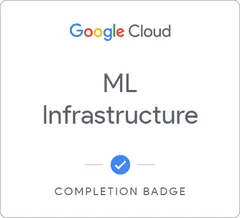
Advanced ML: ML Infrastructure 
Discover the fundamentals of Advanced ML: ML Infrastructure ▼
ADVERTISEMENT
Course Feature
![]() Cost:
Cost:
Free
![]() Provider:
Provider:
Qwiklabs
![]() Certificate:
Certificate:
Free Certification
![]() Language:
Language:
English
![]() Start Date:
Start Date:
On-Demand
Course Overview
❗The content presented here is sourced directly from Qwiklabs platform. For comprehensive course details, including enrollment information, simply click on the 'Go to class' link on our website.
Updated in [May 19th, 2023]
This course provides an overview of the advanced ML infrastructure available on Google Cloud Platform (GCP). Participants will gain hands-on experience with machine learning at scale and learn how to employ the advanced ML infrastructure available on GCP. Topics covered include: GCP's APIs, Cloud ML Engine, TensorFlow, and BigQuery ML. By the end of the course, participants will have a better understanding of how to use GCP's advanced ML infrastructure to build and deploy machine learning models.
[Applications]
After completing this course, students should be able to apply the knowledge they have gained to build and deploy machine learning models on GCP. They should be able to use the various APIs available on GCP to create and manage machine learning pipelines, and be able to use the advanced ML infrastructure to scale their models. Additionally, they should be able to use the various tools available on GCP to monitor and optimize their models.
[Career Paths]
1. Machine Learning Engineer: Machine Learning Engineers are responsible for designing, developing, and deploying machine learning models. They must have a strong understanding of the underlying algorithms and be able to develop and optimize models for a variety of tasks. As the demand for machine learning increases, so does the need for Machine Learning Engineers.
2. Data Scientist: Data Scientists are responsible for analyzing large datasets and extracting insights from them. They must have a strong understanding of statistics and be able to use a variety of tools to analyze data. As the amount of data available continues to grow, so does the need for Data Scientists.
3. AI/ML Researcher: AI/ML Researchers are responsible for researching and developing new algorithms and techniques for machine learning. They must have a strong understanding of the underlying mathematics and be able to develop new algorithms and techniques. As the field of machine learning continues to evolve, so does the need for AI/ML Researchers.
4. Cloud ML Engineer: Cloud ML Engineers are responsible for deploying and managing machine learning models on the cloud. They must have a strong understanding of the cloud infrastructure and be able to deploy and manage models on the cloud. As the demand for cloud-based machine learning increases, so does the need for Cloud ML Engineers.
[Education Paths]
1. Bachelor's Degree in Computer Science: A Bachelor's Degree in Computer Science is a great way to get started in the field of Machine Learning. This degree will provide students with the foundational knowledge and skills needed to understand the fundamentals of ML and its applications. Additionally, students will gain an understanding of the various algorithms and techniques used in ML, as well as the tools and frameworks available to develop ML applications.
2. Master's Degree in Artificial Intelligence: A Master's Degree in Artificial Intelligence is a great way to further develop your skills in ML. This degree will provide students with an in-depth understanding of the various algorithms and techniques used in ML, as well as the tools and frameworks available to develop ML applications. Additionally, students will gain an understanding of the various ML infrastructure available on GCP, and how to employ them to develop ML applications.
3. PhD in Machine Learning: A PhD in Machine Learning is the highest level of education available in the field of ML. This degree will provide students with an in-depth understanding of the various algorithms and techniques used in ML, as well as the tools and frameworks available to develop ML applications. Additionally, students will gain an understanding of the various ML infrastructure available on GCP, and how to employ them to develop ML applications. Additionally, students will gain an understanding of the various research trends in ML, and how to apply them to develop ML applications.
4. Data Science Certificate: A Data Science Certificate is a great way to gain an understanding of the various ML algorithms and techniques used in ML, as well as the tools and frameworks available to develop ML applications. Additionally, students will gain an understanding of the various ML infrastructure available on GCP, and how to employ them to develop ML applications. Additionally, students will gain an understanding of the various research trends in ML, and how to apply them to develop ML applications. Additionally, students will gain an understanding of the various data science techniques used in ML, and how to apply them to develop ML applications.
Course Syllabus
Scikit-learn Model Serving with Online Prediction Using AI Platform
In this lab you will build a simple scikit-learn model, upload the model to AI Platform Prediction, and make predictions against the model.Vertex AI: Qwik Start
In this lab, you will use BigQuery for data processing and exploratory data analysis, and the Vertex AI platform to train and deploy a custom TensorFlow Regressor model to predict customer lifetime value (CLV). The goal of the lab is to introduce to Vertex AI through a high value real world use case - predictive CLV. Starting with a local BigQuery and TensorFlow workflow, you will progress toward training and deploying your model in the cloud with Vertex AI.TFX on Google Cloud Vertex Pipelines
In this lab you will develop, deploy, and run a TFX pipeline on Google Cloud Vertex Pipelines.Autoscaling TensorFlow Model Deployments with TF Serving and Kubernetes
AutoML Vision helps developers with limited ML expertise train high quality image recognition models. In this hands-on lab, you will learn how to train a custom model to recognize different types of clouds (cumulus, cumulonimbus, etc.).Implementing Canary Releases of TensorFlow Model Deployments with Kubernetes and Istio
AutoML Vision helps developers with limited ML expertise train high quality image recognition models. In this hands-on lab, you will learn how to train a custom model to recognize different types of clouds (cumulus, cumulonimbus, etc.).Course Provider

Provider Qwiklabs's Stats at AZClass
Discussion and Reviews
0.0 (Based on 0 reviews)
Explore Similar Online Courses

Serverless Data Processing with Dataflow

Complete Java SE 8 Developer Bootcamp - OCA Prep Included

Python for Informatics: Exploring Information

Social Network Analysis

Introduction to Systematic Review and Meta-Analysis

The Analytics Edge

DCO042 - Python For Informatics

Causal Diagrams: Draw Your Assumptions Before Your Conclusions

Whole genome sequencing of bacterial genomes - tools and applications

Serverless Data Processing with Dataflow: Develop Pipelines

Serverless Data Processing with Dataflow: Foundations


Start your review of Advanced ML: ML Infrastructure